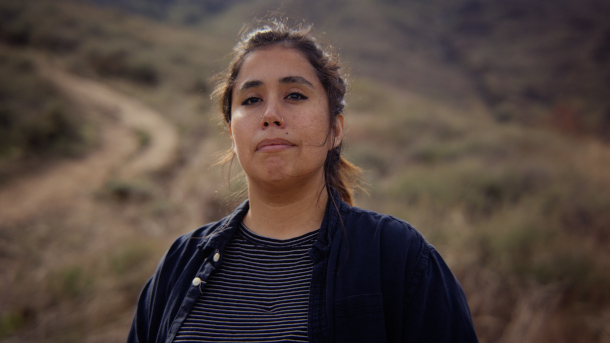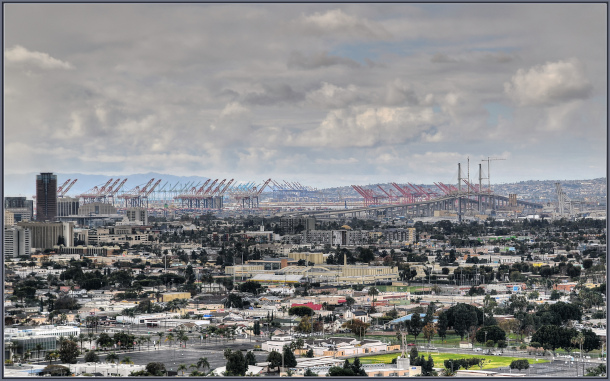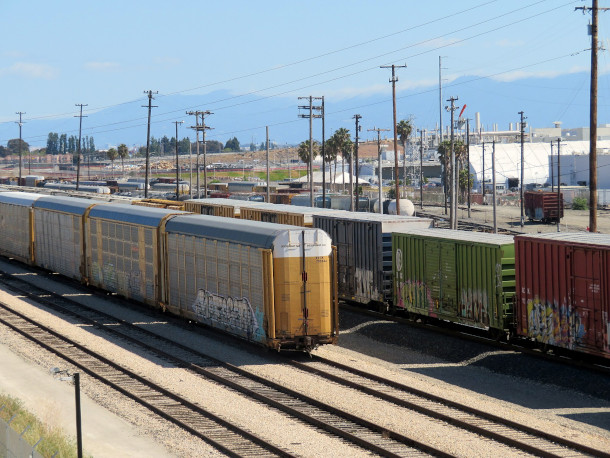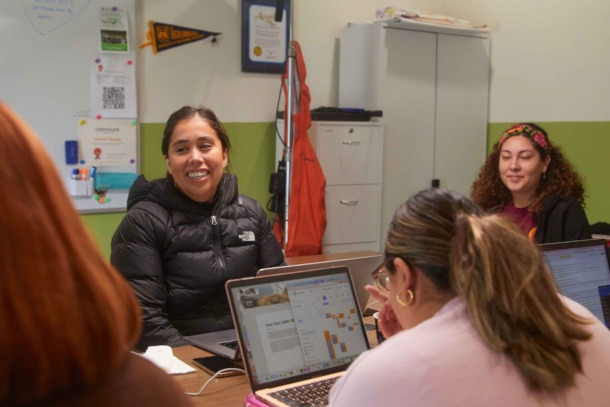Shopping
Living on Earth: Fighting Pollution Linked to Online Shopping

The 2024 Goldman Prize winner for North America, Andrea Vidaurre. (Photo: Goldman Environmental Prize)
The 2024 Goldman Environmental Prize recipient from North America, Andrea Vidaurre led a campaign that convinced the California Air Resources Board to make rules designed to decrease air pollution and lead to zero-emission trucking by 2036. These rules are aimed at reducing diesel pollution related to the online shopping industry. Andrea joined Living on Earth’s Paloma Beltran to discuss how these new rules are aimed at reducing toxic air pollution in the Inland Empire of Southern California.
Transcript
BELTRAN: The Inland Empire region of Southern California is home to over 4 million people. Located directly east of Los Angeles, the area also serves as a hub for logistical infrastructure. These include railroads, warehouses, trucks, and trains that make much of online shopping possible. The diesel pollution released by this industry has been linked to increased rates of asthma, cancer, and premature death among the predominately Latino residents of the area. Fortunately, Andrea Vidaurre stepped in to help. Andrea is an environmental activist, community organizer, and the North American winner of the 2024 Goldman Environmental Prize. She led a campaign to convince the California Air Resources Board to make rules designed to decrease air pollution and lead to zero-emission trucking by 2036. But part of the federal Clean Air Act limits state and local governments from regulating vehicle emissions. California has some exemptions, but these new rules are awaiting EPA approval. Andrea Vidaurre joins me now to explain more. Andrea, welcome to Living on Earth!
VIDAURRE: Hi there. Thanks for having me.
BELTRAN: So Andrea, I understand that you’re from the Inland Empire in California and the director of the People’s Collective for Environmental Justice. Please tell me about your community and the work that you do.
VIDAURRE: Yeah, so I am actually one of the co-founders of the People’s Collective. I am the policy coordinator right now. And our organization was born in 2020. In the pandemic, we saw a lot of increase in online shopping. And what happened was, we were responding to what we already saw happening in our communities, which was the increase of logistics infrastructure, such as warehouses, the expansion of railroads, freeways, and most importantly, trucks and trains in our communities. And so we organize in the Inland Empire, we work with community groups, and we try to fight for the solutions that we want, which is we’re trying to clean up the air quality, because we know that the air quality right now is what’s hurting so many people living in the Inland Empire.

Los Angeles and Long Beach, California are the two busiest ports in the US and are linked to transportation networks that facilitate global commerce and drive economic growth for the region and beyond. (Photo: TD Lucas, Flickr, CC BY 2.0)
BELTRAN: I have actually seen part of the Long Beach port and driven to the Inland Empire. And it’s surprising how huge it is. It’s enormous.
VIDAURRE: It is huge. You’re talking about giant concrete walls, giant concrete boxes, 1 million, 2 million, 3 million square feet. Sometimes they block the view of the mountains. Sometimes they block the view of the street. And in these warehouses, you know, you have trucks that come in and out every single day around the clock.
BELTRAN: I’ve heard that Riverside and San Bernardino counties are referred to as the “diesel death zone.” Why is that?
VIDAURRE: Yeah, that’s a term that was created to talk about how diesel is deadly. There is no safe level of diesel to be breathing in. And we breathe it in every single day around the clock. And those come with real consequences. Children growing up with industrial allergies, and asthma, which keeps them away from going to school sometimes, which makes it hard to breathe when it’s really hot outside. Diesel also is known to cause respiratory issues for people that are older, and the most vulnerable is our elderly community. And we have stories all over the place of people that have had double lung transplants, or have to be connected to a breathing machine, even though they’ve never smoked a day in their life, right? And that, that’s from diesel, right, that’s from the toxins in the air.
BELTRAN: And in 2018, you worked as a community organizer in areas experiencing increased air pollution and advocated for the California Air Resources Board, also known as CARB, to pass new rules. Tell us more about that.
VIDAURRE: Yeah, so we know that one of the solutions to dealing with the massive growth of the logistics industry is to deal with the air quality issues. And so CARB, the California Air Resources Board, their responsibility in the state of California, is to protect the public health and the air quality. And so communities for decades have been working to push government agencies to do something around air pollution. And really, I came in at a time, after decades of work from other environmental justice communities in the LA area and across the state who had been calling for zero emissions. They’ve been calling for pollution to be out of their neighborhoods. And that work really has led us to where we are now, which is we are at a place where with zero emissions is being talked about. The technology is being created. The infrastructure is being put. I mean, we’re at a whole different place. And so 2018, when we started doing this work, CARB was still figuring out, like, should we go in this direction? Do we go all in? And it was really important for us to get involved and get our community involved. Because this is a lifesaving regulation. We know that the emissions reductions that we’ll get from this rule will save lives, will prevent emergency room visits, will prevent asthma attacks, will prevent premature death.
BELTRAN: And as a result of all your hard work and the hard work of your community, the In-Use Locomotive rule and the California Advanced Clean Fleets rule was passed. What do these regulations entail?
VIDAURRE: Super fancy words, right? So for short, I call them the truck and the train rule, because that’s what they are: the regulations that address truck emissions and train emissions. And so what these rules will do is for trucks, at least, it will require fleet owners, so these companies that have giant fleets of trucks, to transition over the next coming years to zero-emission trucks, to start replacing their diesel trucks with electric trucks. And then for the trains, very similar. Right now, the train system is incredibly unregulated. It’s one of the most unregulated industries in our society, and they still operate using train technology that is 50, 60 years old. And so the train regulation will require some type of the trains to start being replaced sooner, which has never happened before.
BELTRAN: And how did you organize your local community to advocate for these regulations to be passed?

Freight trains across California currently use diesel engines. In response to the public health danger this posed to her local community, Andrea Vidaurre pushed for zero-emissions legislation in the transportation sector. (Photo: Picasa, Wikimedia Commons, CC BY-SA 3.0)
VIDAURRE: I am part of a wonderful team at the People’s Collective for Environmental Justice. I’m part of a larger network called the Moving Forward Network. We’re all communities impacted by freight who are organizing in our neighborhoods, and we do it the way that it works for us. And so for us in the Inland Empire, it looks like us talking to our neighbors, talking to folks that are the most impacted, holding meetings, listening to people that are the most impacted and what they need, what they want to have a healthier life. We use a lot of the arts to organize our communities, right, hosting art events so that people can express themselves and what they’re going through. But we also work with local communities so that they can host their own types of events, right, whether it’s in a rancho, or whether it’s in the back of someone’s home, right. People were opening up their home so that their neighbors could come and learn about what’s going on around truck and train emissions. We took all of that energy to CARB. We planned rallies outside of CARB. And we were putting our voices out into the community so that they could not be ignored.
BELTRAN: And I understand that you also organized something called “toxic tours,” which were tours of frontline communities in the Inland Empire so that CARB members and state legislators could witness firsthand the pollutions those communities were subjected to. What was the reaction?
VIDAURRE: The reaction of legislators and decision makers, when they’re on toxic tours, is usually pretty silent, taking it all in. It’s a lot of processing. For the most part, folks hear us two minutes, three minutes on the podium when we go up and we speak, right? And that’s not enough time to tell you the full story, right? You need to see it; you need to breathe it; need to feel it. And so that’s what we do, right? We kind of take people to experience a day in the life. And so we take people to those places, and so they hear directly from people impacted. And with that being like the evidence that they need, so that they can work on how strict these rules have to be. There is data. There is always going to be quantitative data. But qualitative data is just as important, hearing from voices on the ground.
BELTRAN: Altogether, the online shopping industry, the trucking and freight train industry are worth billions of dollars. What were some of the pushbacks or challenges you faced from industry?
VIDAURRE: Some of the pushbacks that we faced, I think, was around delays from the industry. I think we experienced a lot of attempts to delay the rulemaking, to say that it wasn’t necessary, a lot of misinformation about the technology availability, a lot of legal threats from their side, a lot of money that they have, as you mentioned, to be able to shape the narrative. And so our work here is to disrupt that, right, and ground truth, all of this. The only way to do it is with this big power building, this movement building you need to do in your communities. We’re able to overcome that with community organizing. We’re able to overcome that when we are partnering with other groups and growing our power.

Andrea Vidaurre in conversation with her colleagues from the People’s Collective for Environmental Justice. (Photo: Goldman Environmental Prize)
BELTRAN: Transportation and the transportation industry is an intersectional issue across the world. What are some other things that come to mind when it comes to environmental justice issues that you’re aware of and you’re advocating for?
VIDAURRE: It’s very important for us to get pollution out of our neighborhoods, to get diesel out of our neighborhoods. It’s equally as important for us to make sure that a solution for us is not the problem for another community. And so as we think about electrification of our transportation system, and of a lot of our systems that we need so that we can make sure that we reduce climate pollution, we need to be thinking about critical mineral extraction and lithium extraction. And so at the same time we’re fighting for electrification, we also need to be fighting for more public transportation, for more walkable cities, for ways that make sure that we are localizing more of our economy. So we are not so dependent on these systems that require a lot of transportation of our goods. And so just to say that, you know, this is a multi-prong approach, and that’s the only way it will be if we truly are going to have environmental justice throughout all communities.
BELTRAN: What inspires you to keep going?
VIDAURRE: I’m inspired by the people around me to keep going. I’m inspired by the people that I work with. I’m inspired by elders and by youth; by elders who are like, “I don’t know if I’m going to see the end of all of this, the benefits, but I’m gonna fight like I am. I fight for my kids and my grandkids.” I’m super inspired by the youth who want to like, fight, you know what I mean? Like they’re fighting like, you know, for their lives, right, they get it. I’m also inspired by just this larger movement we’re a part of, that is about changing the way our society operates. I’m constantly inspired by people who are taking on what seems like a big part problem, because we have to take on the big problems. We cannot take on the easy ones.
BELTRAN: Andrea Vidaurre is the North American winner of the 2024 Goldman Environmental Prize. Thank you, Andrea, for joining us.
VIDAURRE: Thank you.
Links
More about Andrea Vidaurre’s journey
More about the new regulations
More about the People’s Collective for Environmental Justice
More about the Moving Forward Network








